will和be-going-to的练习题及参考答案
一般将来时begoingto与will的解析和练习

练习4: 完形填空
The party (1) at 8 pm tomorrow. We (2) many things to prepare. First, we (3) some food and drinks. Then we (4) the furniture and (5) some music. We hope you can join us!
使用正确的动词和时间状语。
练习8: 用一般将来时回答问题
使用正确的动词形式描述将发生的事情。
一般将来时中的日常口语表达
常用短语
1. I am going to… (我打算… ) 2. She will probably… (她可能会… ) 3. He will most likely… (他很可能会… )
一般将来时 bgoingto 与 will 的解析和练习
一般将来时是英语中最常用的时态之一,它用来描述将要发生的事情或预测 未来。本文将讨论一般将来时的两种构成方式:be going to 和 will。我们将 解析它们的用法,区别,在多种情景中的应用,并提供丰富的练习来帮助你 熟练掌握这种时态。
一般将来时的概述
时间状语从句的使用方法
时间状语从句用于描述一种更具体的时间或日期,并且通常以连词“when”或 “while”开始。
其他表示未来的形式
除了一般将来时,还有许多其他描述未来的语法形式,如进行时将来时和完 成时将来时。
一般将来时中的动词时态
动词时态用于描述正在进行的动作,是否完成或是否在将来进行。未来进行时态,将来完成时态和现在 完成进行时态均用于将来某个时刻或动作的描述。
练习3: 改变句子的时态
练习1
改写下面的句子,用将来进行 时: "I will be studying English tomorrow."
英语语法一般将来时be going to练习题

英语语法一般将来时be going to用法和习题be going to +动词原形=will +动词原形将要做.../打算做...1、肯定句结构:主语+be(am/is/are)going to +动词原形2、否定句结构:主语+be (am/is/are) not going to +动词原形3、一般疑问句结构:be (am/is/are) +主语+going to +动词原形肯定回答:Yes,主语(人称代词)+am/is/are.否定回答:No, 主语(人称代词)+am/is/are +not.be动词用法口诀I 用_____, you 用_____, is 连着____、_____、_____.单数用_____, 复数用______(一)选择填空。
()1.I ____ going to play football tomorrow. A.is B.am C.are ()2.She ____ going to climb mountain(爬山). A.am B.is C.are ()3.He ____ going to swim. A.am B.are C.is()4.They____ going to go to school. A.am B.is C.are()5.You____ going to go to bed. A.am B.are C.is()6.Lucy’s mother ____ going to watch TV. A am B is C are ()7.____ she going to dance? A.am B.is C.are()8.____ you going to have lunch? A.am B.is C.are()9.____ I going to play the piano? A am B is C are()10.I am going to ______ stories. A read B reads C reading()11.She is going to ______ the violin. A play B plays C playing ()12.Are we going to ______a play? A puts on B putting on Cput on ()13.Is my sister going to ______? A drawing B draws Cdraw ()14.What are you going to ______? A does B do Cdoing()15.Where are we going to ______? A go shopping B goes shopping (二)把下列肯定句变为否定句。
Be_going_to的用法与练习

be going to 帮你来“打算”一、概念:be going to 表示将要发生的动作或存在的状态及打算、计划或准备做某事。
属于一般将来时。
二、基本结构:①be going to + do;②will+ do.be going to的特殊疑问句形式构成方式:疑问词+be going to的一般疑问句。
一个口诀献给大家:疑问词在句首,系动词be跟着走,主语、going紧相随,它成分不要丢。
三、否定句:在be动词(am, is, are, was, were)或情态动词will后加not成won’t。
例如:I’m going to have a picnic this afternoon.I’m not going to have a picnic this afternoon.四、一般疑问句:be或will提到句首,some改为any, and改为or,第一二人称互换。
例如:We are going to go on an outing this weekend.Are you going to go on an outing this weekend?五、同义句:be going to = willI am going to go swimming tomorrow(明天). = I will go swimming tomorrow.但是特别注意:be going to与will两者都可表示将要发生的事、将要去做某事,但它们有如下几点区别:1. be going to 表示近期、眼下就要发生的事情,will 表示的将来时间则较远一些,如:He is going to write a letter tonight.He will write a book one day.2. be going to 表示根据主观判断将来肯定发生的事情,will表示客观上将来势必发生的事情。
He is seriously ill. He is going to die.He will be twenty years old.3. be going to 含有“计划,准备”的意思,而will 则没有这个意思,如:She is going to lend us her book.He will be here in half an hour.现在口语书面语言在互相交织的今天,从不严格的语法角度,二者互换也是可以接受的。
高中英语一般将来时试题(有答案和解析)及解析
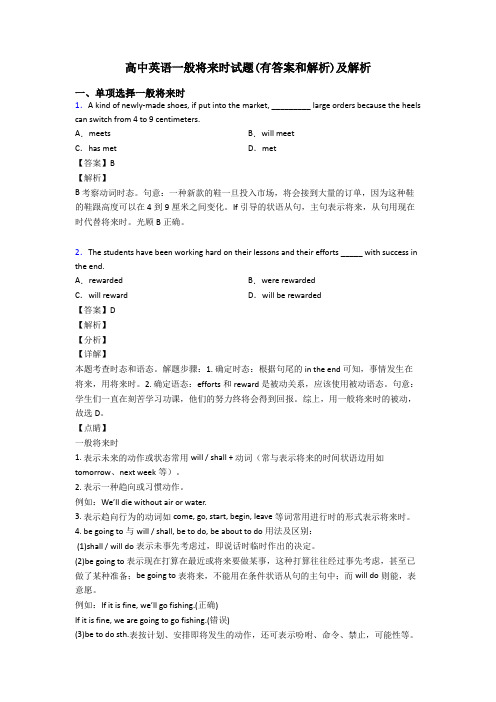
高中英语一般将来时试题(有答案和解析)及解析一、单项选择一般将来时1.A kind of newly-made shoes, if put into the market, _________ large orders because the heels can switch from 4 to 9 centimeters.A.meets B.will meetC.has met D.met【答案】B【解析】B 考察动词时态。
句意:一种新款的鞋一旦投入市场,将会接到大量的订单,因为这种鞋的鞋跟高度可以在4到9厘米之间变化。
If引导的状语从句,主句表示将来,从句用现在时代替将来时。
光顾B正确。
2.The students have been working hard on their lessons and their efforts _____ with success in the end.A.rewarded B.were rewardedC.will reward D.will be rewarded【答案】D【解析】【分析】【详解】本题考查时态和语态。
解题步骤:1. 确定时态:根据句尾的in the end可知,事情发生在将来,用将来时。
2. 确定语态:efforts和reward是被动关系,应该使用被动语态。
句意:学生们一直在刻苦学习功课,他们的努力终将会得到回报。
综上,用一般将来时的被动,故选D。
【点睛】一般将来时1. 表示未来的动作或状态常用will / shall + 动词(常与表示将来的时间状语边用如tomorrow、next week等)。
2. 表示一种趋向或习惯动作。
例如:We’ll die without air or water.3. 表示趋向行为的动词如come, go, start, begin, leave等词常用进行时的形式表示将来时。
4. be going to与will / shall, be to do, be about to do用法及区别:(1)shall / will do表示未事先考虑过,即说话时临时作出的决定。
(完整word版)一般将来时练习题及答案学习
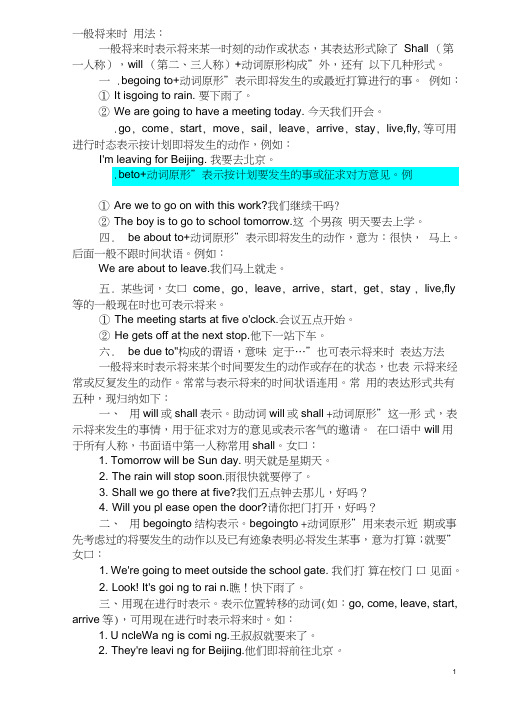
一般将来时用法:一般将来时表示将来某一时刻的动作或状态,其表达形式除了Shall (第一人称),will (第二、三人称)+动词原形构成”外,还有以下几种形式。
一 .begoing to+动词原形”表示即将发生的或最近打算进行的事。
例如:①It isgoing to rain. 要下雨了。
②We are going to have a meeting today. 今天我们开会。
.go, come, start, move, sail, leave, arrive, stay, live,fly, 等可用进行时态表示按计划即将发生的动作,例如:①Are we to go on with this work?我们继续干吗?②The boy is to go to school tomorrow.这个男孩明天要去上学。
四.be about to+动词原形”表示即将发生的动作,意为:很快,马上。
后面一般不跟时间状语。
例如:We are about to leave.我们马上就走。
五.某些词,女口come, go, leave, arrive, start, get, stay , live,fly 等的一般现在时也可表示将来。
①The meeting starts at five o'clock.会议五点开始。
②He gets off at the next stop.他下一站下车。
六.be due to"构成的谓语,意味定于…”也可表示将来时表达方法一般将来时表示将来某个时间要发生的动作或存在的状态,也表示将来经常或反复发生的动作。
常常与表示将来的时间状语连用。
常用的表达形式共有五种,现归纳如下:一、用will或shall表示。
助动词will或shall +动词原形”这一形式,表示将来发生的事情,用于征求对方的意见或表示客气的邀请。
在口语中will用于所有人称,书面语中第一人称常用shall。
小升初英语一般将来时 be going to 和 will 区别单选题40题

小升初英语一般将来时be going to 和will 区别单选题40题1.I ______ play football tomorrow.A.am going toB.willC.am goingD.go to答案:B。
本题考查一般将来时的用法。
A 选项“am going to”通常表示有计划、打算做某事;B 选项“will”更侧重于主观意愿;C 选项“am going”缺少“to”,不完整;D 选项“go to”是一般现在时,不符合题意。
本题中没有体现有计划地去踢足球,而是一种主观意愿,所以选B。
2.She ______ visit her grandparents this weekend.A.is going toB.willC.is goingD.goes to答案:A。
“this weekend”表明是将来的时间,A 选项“is going to”表示有计划地做某事;B 选项“will”也可以表示将来,但没有体现出计划;C 选项“is going”缺少“to”;D 选项“goes to”是一般现在时。
本题中说她这个周末要去看望祖父母,通常是有计划的行为,所以选A。
3.We ______ have a picnic if the weather is fine.A.are going toB.willC.are goingD.go to答案:B。
本题中如果天气好我们去野餐,这更多是一种主观意愿,不是有明确计划的行为,所以用“will”更合适。
A 选项“are going to”一般表示有计划;C 选项“are going”缺少“to”;D 选项“go to”是一般现在时。
所以选B。
4.He ______ buy a new book after school.A.is going toB.willC.is goingD.goes to答案:A。
放学后买新书通常是有一定计划的行为,所以用“is going to”更合适。
将来时will和begoing to

Be going to do:表示近期,眼下就要发生的事情,着重强调计划做某事
Will:说话者突然做出的决定(一般用will的缩略式‘ll),表意图,提议,许诺,自愿做,坚持做,请求或邀请,客观上将来势必发生的事情,习惯规律,
be going to do
Eg :
1.He is going to write a letter tonight.
2.What are you going to be when you grow up?
3.- why have you torn the paper into pieces?
- I am going to rewrite it.
Will:
Eg
1.说话者突然做出的决定
I am tired. I think I’ll go to bed
Come to supper.
Ok, thanks, I’ll bring a bottle.
2.表意图,提议,许诺,自愿做,坚持做
There’s the doorbell - i’ll go
I will stop smoking - i really will.
3.请求或邀请
Will you give me a hand ?
Will you come in and have a drink.
4.习惯规律
She will greet me when she meets me
Man will die.。
英语高中一般将来时练习题及解析

英语高中一般将来时练习题及解析一、单项选择一般将来时1.(吉林长春高中毕业班第一次调研—Don't worry. I _______ it for you. Wait a minute.A . getB .am going to getC . will get 【答案】 C【解析】C 考查时态。
答语意为 “别担心,我帮你去取。
等一下。
”此处 will 用于一般将来时,表示 “将要做临时决定的事情 ”。
2. The students have been working hard on their lessons and their efforts ____ with success in the end. A . rewarded B . were rewarded C . will rewardD . will be rewarded【答案】 D 【解析】 【分析】 【详解】本题考查时态和语态。
解题步骤: 1. 确定时态:根据句尾的 in the end 可知,事情发生在 将来,用将来时。
2. 确定语态: efforts 和 reward 是被动关系,应该使用被动语态。
句意: 学生们一直在刻苦学习功课,他们的努力终将会得到回报。
综上,用一般将来时的被动, 故选 D 。
【点睛】 一般将来时1. 表示未来的动作或状态常用 will / shall + 动词(常与表示将来的时间状语边用如 tomorrow 、 next week等)。
2. 表示一种趋向或习惯动作。
例如: We ' ll die without air or water.3. 表示趋向行为的动词如 come, go, start, begin, leave 等词常用进行时的形式表示将来时。
4. be going to 与 will / shall, be to do, be about to do 用法及区别: (1) shall / will do 表示未事先考虑过,即说话时临时作出的决定。
begoingto结构以及与will区别以及练习

2017.11.26“ be going to 结构一、“ be goi ng to表示将要发生的事或打算、计划、安排要做的事。
它是一般将来时的一种表达形式,其后常有表示将来的时间状语。
女口:tomorrow, next week 等。
例如:We are going to play football tomorrow. 明天我们将去踢足球。
二、构成:be going to +动词原形。
在be going to结构中,be随主语人称和数的变化而变化, 而going to 固定不变。
例如:clea n the classroom tomorrow.He is going toThey are going to clean the classroom tomorrow.三、句式变化:be going to结构的句式变化都可在be上完成。
变疑问句时,将be提至主语之前;变否定句在be后加not。
例如:They are not going to have a picnic next week.下星期他们将不去野餐。
Are they going to have a picnic next week?下星期他们将去野餐吗?What are they going to do n ext week?下星期他们打算干什么?四、“be going to动词原形”的用法。
1. 表示主语打算、安排在最近或将来要做某事或出现的某种状态。
这种主观意图,一般已做过事先安排,故其实现的可能性较大,其主语常是人。
例如:We are going to swim n ext Sun day.下星期天我们打算去游泳。
(已打算好下星期天去游泳)2. 表示根据现有情况、某种迹象,判断将要或即将发生的动作。
此时不含有主观意图,只是表示说话人对客观事态发展的判断或推测,此时主语可以是人,也可以是物。
例如:Look! It ' s g otn rain.看!天要下雨了。
小学英语一般将来时练习题及答案
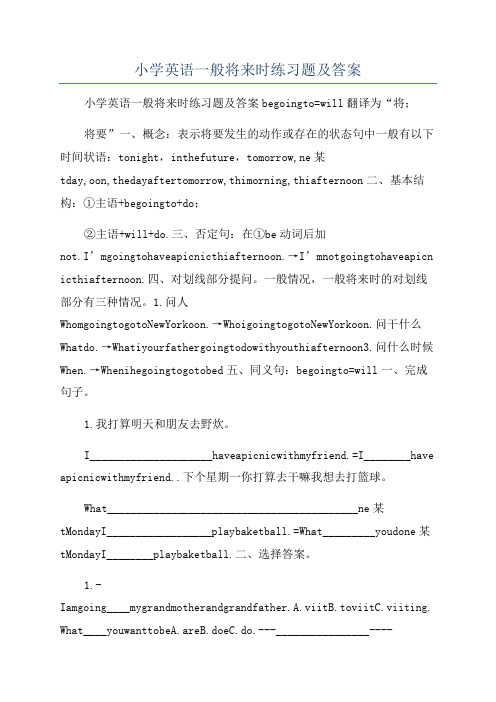
小学英语一般将来时练习题及答案小学英语一般将来时练习题及答案begoingto=will翻译为“将;将要”一、概念:表示将要发生的动作或存在的状态句中一般有以下时间状语:tonight,inthefuture,tomorrow,ne某tday,oon,thedayaftertomorrow,thimorning,thiafternoon二、基本结构:①主语+begoingto+do;②主语+will+do.三、否定句:在①be动词后加not.I’mgoingtohaveapicnicthiafternoon.→I’mnotgoingtohaveapicn icthiafternoon.四、对划线部分提问。
一般情况,一般将来时的对划线部分有三种情况。
1.问人WhomgoingtogotoNewYorkoon.→WhoigoingtogotoNewYorkoon.问干什么Whatdo.→Whatiyourfathergoingtodowithyouthiafternoon3.问什么时候Whe n.→Whenihegoingtogotobed五、同义句:begoingto=will一、完成句子。
1.我打算明天和朋友去野炊。
I_____________________haveapicnicwithmyfriend.=I________have apicnicwithmyfriend..下个星期一你打算去干嘛我想去打篮球。
What___________________________________________ne某tMondayI__________________playbaketball.=What_________youdone某tMondayI________playbaketball.二、选择答案。
1.-Iamgoing____mygrandmotherandgrandfather.A.viitB.toviitC.viiting. What____youwanttobeA.areB.doeC.do.---________________----I’mgoingtotheciencemueum.A.WhatareyougoingtodothiafternoonB.Wha tareyoudoing4.----________________------Onfoot.A.DoyougotochoolbybikeeverydayB.Howdoyougotochooleveryday,Helen5.-----__________.-----Iuuallyreadbook.A.WhatareyoudoingB.Whatdoyoudointheevening三、选择填空。
一般将来时讲解(附习题+答案)

一般将来时讲解(附习题+答案)一、一般将来时的含义:表示动作发生在将来二、一般将来时的句型:(1) will/shall+动词原形(2) be going to+动词原形三、一般将来时的时间状语:tomorrow(明天)、the day after tomorrow(后天)、next...(下一...): next week(下一周)、next year(明年)、next month(下个月)in+一段时间(...之后): in three days(三天之后)、in the future在未来this evening(今天晚上)四、一般将来时的句型结构:(1) will/shall+动词原形(will not =won’t)(will 各种人称均可用,shall 只能用于第一人称)1)肯定句:主语+will/shall+动词原型...如:I will go to school tomorrow.我明天将会去学校He will go to school tomorrow.他明天将会去学校。
2)否定句:主语+will/shall+not+动词原型...如:I won’t go to school tomorrow.我明天将不会去学校。
He won’t go to school tomorrow.他明天将不会去学校。
3)一般疑问句:Will/Shall +主语+动词原型...如:Will you go to school tomorrow?你明天要去学校吗?Will he go to school tomorrow?他明天要去学校吗?肯定回答:Yes, 主语+will.如:Yes, I will.Yes, he will.否定回答:No,主语+will+not.如:No, I won’t.No, he won’t.4) 特殊疑问句:特殊疑问词+will/shall+主语+动词原型...如:What will you do tomorrow?你明天将会做什么?What will he do tomorrow?他明天将会做什么?(2) be going to+动词原形1)肯定句:主语+be going to +动词原型...如:I am going to buy some books tomorrow.我明天打算去买一些书。
最新will和be_going_to的练习题及参考答案资料

牛刀小试一、单项选择。
( ) 1. There _______ a meeting tomorrow afternoon.A. will be going toB. will going to beC. is going to beD. will go to be( ) 2. Charlie ______________ here next month.A. isn 't workin gB. doesn 't workingC. isn ' t going to workin gD. won' t work( ) 3. He ____________ very busy this week, he _______ free next week.A. will be; isB. is; isC. will be; will beD. is; will be( ) 4. There ___________ a dolphin show in the zoo tomorrow evening. A. was B. is going to haveC. will haveD. is going to be( )5. — _______ y ou ________ free tomorrow?- No. I _________ f ree the day after tomorrow.A. Are; going to; willB. Are; going to be; willC. Are; going to; will beD. Are; going to be; will be( ) 6. Mother _______ me a nice present on my next birthday.A. will givesB. will giveC. givesD. give( )7. - Shall I buy a cup of tea for you?- ________ .(不,不要。
will和be-going-to的练习题及参考答案.doc

精品牛刀小试一、单项选择。
( ) 1. There ____ a meeting tomorrow afternoon.A. will be going toB. will going to beC. is going to beD. will go to be( ) 2. Charlie ________ here next month.A. isn’ t workingB. doesn’ t workingC. isn’ t going to workingD. won’ t work( ) 3. He ________ very busy this week, he ________ free next week.A. will be; isB. is; isC. will be; will beD. is; will be( ) 4. There ________ a dolphin show in the zoo tomorrow evening.A. wasB. is going to haveC. will haveD. is going to be( ) 5. –________ you ________ free tomorrow?–No. I ________ free the day after tomorrow.A. Are; going to; willB. Are; going to be; willC. Are; going to; will beD. Are; going to be; will be( ) 6. Mother ________ me a nice present on my next birthday.A. will givesB. will giveC. givesD. give( ) 7. –Shall I buy a cup of tea for you?–________.(不,不要。
一般将来时be-going-to-与will的解析和练习

afternoon. 今天下午我们打算开班会。(安排)
Look at the black clouds. It's going to rain. 看那些乌云,快要下雨了。(推测)
二、be going to 在肯定句中的形式
you ....?” 例如: They are going to see the car factory next week. (肯定句) They are not going to see the car factory next week. (否 定句)
—Are they going to see the car factory next week? —Yes, they are. (No, they aren't.) (一般疑问句及其回答)
2.They _a_r_e_g_o_i_n_g__to__fi_n_i_sh__ (finish) the work this afternoon.
3. __Is__ Tom _g_o_i_n_g__to__p_la_y_ (play) football with us tomorrow?
4.There _a_r_e_g_o_i_n_g_t_o__b_e_ (be) strong winds tonight.
特殊疑问句结构:
特殊疑问词+will +主语+动词原形+其他?
2. There will be
如:There will be a sports meeting at our school next week. 一般疑问式: Will there be a sports meeting at our school next week? 回答:
(英语)高考英语一般将来时练习题及答案
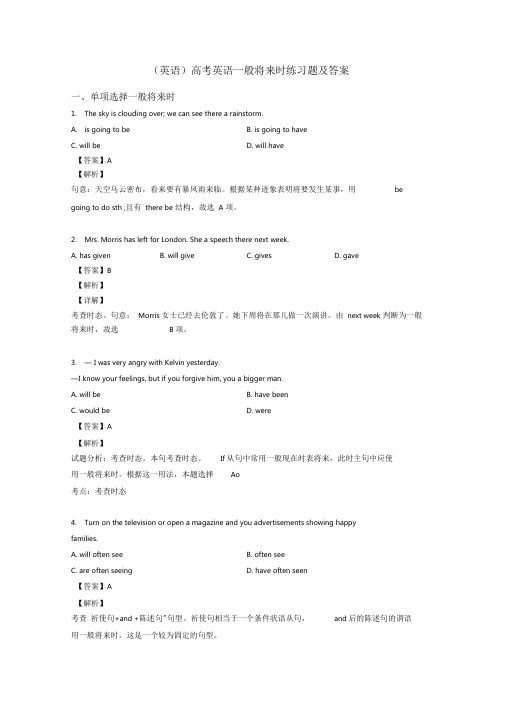
(英语)高考英语一般将来时练习题及答案一、单项选择一般将来时1.The sky is clouding over; we can see there a rainstorm.A.is going to beB. is going to haveC. will beD. will have【答案】A【解析】句意:天空乌云密布,看来要有暴风雨来临。
根据某种迹象表明将要发生某事,用be going to do sth ,且有there be 结构,故选A 项。
2.Mrs. Morris has left for London. She a speech there next week.A. has givenB. will giveC. givesD. gave【答案】B【解析】【详解】考查时态。
句意:Morris女士已经去伦敦了。
她下周将在那儿做一次演讲。
由next week 判断为一般将来时,故选B项。
3.— I was very angry with Kelvin yesterday.—I know your feelings, but if you forgive him, you a bigger man.A. will beB. have beenC. would beD. were【答案】A【解析】试题分析:考查时态。
本句考查时态。
If从句中常用一般现在时表将来,此时主句中应使用一般将来时。
根据这一用法,本题选择Ao考点:考查时态4.Turn on the television or open a magazine and you advertisements showing happyfamilies.A. will often seeB. often seeC. are often seeingD. have often seen【答案】A【解析】考查祈使句+and +陈述句"句型。
初中英语willshall”与“begoingto”两者的区别及练习(2021年整理)
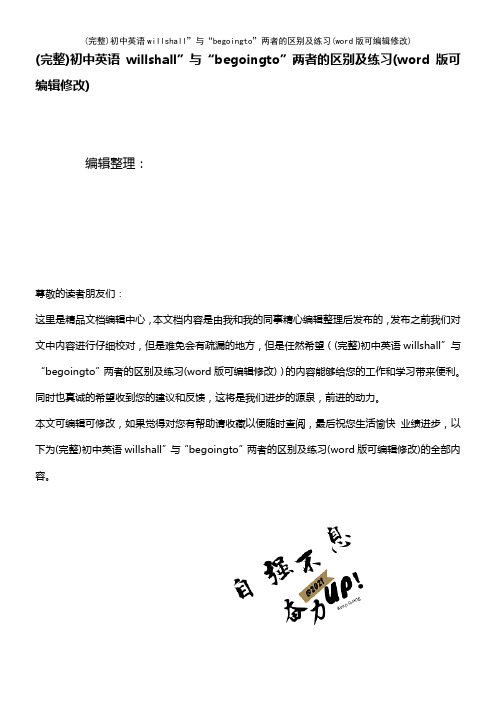
(完整)初中英语willshall”与“begoingto”两者的区别及练习(word版可编辑修改)编辑整理:尊敬的读者朋友们:这里是精品文档编辑中心,本文档内容是由我和我的同事精心编辑整理后发布的,发布之前我们对文中内容进行仔细校对,但是难免会有疏漏的地方,但是任然希望((完整)初中英语willshall”与“begoingto”两者的区别及练习(word版可编辑修改))的内容能够给您的工作和学习带来便利。
同时也真诚的希望收到您的建议和反馈,这将是我们进步的源泉,前进的动力。
本文可编辑可修改,如果觉得对您有帮助请收藏以便随时查阅,最后祝您生活愉快业绩进步,以下为(完整)初中英语willshall”与“begoingto”两者的区别及练习(word版可编辑修改)的全部内容。
初中英语will / shall”与“be going to”两者的区别will / shall+v。
"与“be going to+v。
”。
两者均可表示将来时间和意图,两者有时可换用,有时不可换用。
不可换用的情况主要是:若强调某个意图是经过事先考虑好的,用be going to;若表示某个意图没有经过事先考虑,而是在说话的当时才临时想到的,则用will.比较:“Mary is in hospital.” “Oh, really?I didn’t know. I’ll go and visit her.” “玛丽住院了。
"“啊,真的吗?我还不知道。
我要去看看她。
" (临时想法,不能用be going to)“Mary is in hospital.” “Yes, I know。
I’m going to visit her tomorrow." “玛丽住院了.”“我知道,我打算明天去看看她。
” (事先考虑的意图,不能用will)另外,若指迹象表明要发生某事,用be going to 而不用will。
将来进行时练习题

未来进行时的解说及练习1.一般未来时是指未来某个时间将要发生的动作和状态,基本构造是:主语+will/be going to doI will/am going to Beijing next Sunday.我下个礼拜天将要去北京。
2.未来进行时是指未来某个时间正在进行的动作。
基本构造是:主语+will be/be going to be +doingI will be sleeping at 12:00p.m.十二点的时候我将在睡觉。
I will be studying in university at the age of 20.我 20 岁的时候我将会在大学里学习。
一、未来进行时用来表示在未来的某一个时间正在进行的动作。
① This time next week we shall be working in that factory.下个礼拜的这时候 ,我们将在那个工厂劳动 .②We'll be having a meeting at three o'clock tomorrow afternoon. 明日下午三点 ,我们将正在开会 .③ When will you be seeing Mr. White?你将什么时候见怀特先生?(语气较委宛客气,部下对上级④ The students will be watching TV at seven this evening.今日夜晚七点,学生们将正在看电视.)二、未来进行时主要表示未来某一时辰正在进行的动作,或表示要在未来某一时辰开始,并持续下去的动作。
常用来表示礼貌的咨询,恳求等。
重申在未来的某个详细时间正在发生的动作或事情。
①This time next day they will be sitting in the cinema.②Don't worry, you won't miss her. She will be wearing a red T-shirt and a white skirt at that time.③This time tomorrow you ________ there doing some more exercises.A. will sitB. will be sittingC. sitD. shall sit答案B. this time tomorrow是个很详细的未来时间.三、未来进行时用来表示不含企图又未发生的动作。
- 1、下载文档前请自行甄别文档内容的完整性,平台不提供额外的编辑、内容补充、找答案等附加服务。
- 2、"仅部分预览"的文档,不可在线预览部分如存在完整性等问题,可反馈申请退款(可完整预览的文档不适用该条件!)。
- 3、如文档侵犯您的权益,请联系客服反馈,我们会尽快为您处理(人工客服工作时间:9:00-18:30)。
牛刀小试
一、单项选择。
( ) 1. There ____ a meeting tomorrow afternoon.
A. will be going to
B. will going to be
C. is going to be
D. will go to be
( ) 2. Charlie ________ here next month.
A. isn’t working
B. doesn’t working
C. isn’t going to workin g
D. won’t work
[
( ) 3. He ________ very busy this week, he ________ free next week.
A. will be; is
B. is; is
C. will be; will be
D. is; will be
( ) 4. There ________ a dolphin show in the zoo tomorrow evening.
A. was
B. is going to have
C. will have
D. is going to be
( ) 5. –________ you ________ free tomorrow
– No. I ________ free the day after tomorrow.
^
A. Are; going to; will
B. Are; going to be; will
C. Are; going to; will be
D. Are; going to be; will be
( ) 6. Mother ________ me a nice present on my next birthday.
A. will gives
B. will give
C. gives
D. give
( ) 7. – Shall I buy a cup of tea for you
–________. (不,不要。
)
A. No, you won’t.
B. No, you aren’t.
}
C. No, please don’t. D . No, please.
( ) 8. – Where is the morning paper
– I ________ if for you at once.
A. get
B. am getting
C. to get
D. will get
二、动词填空。
1. I ______(leave)in a minute. I ______(finish)all my work before I
______ (leave).
2. —How long _____ you _____(study)in our country
~
—I _____(plan)to be here for about one more year.
—I _____(hope)to visit the other parts of your country.
—What ______ you ______(do)after you ______(leave)here
—I ______(return)home and ______(get)a job.
3. I ______(be)tired. I ______(go)to bed early tonight.
4. Mary’s birthday is next Monday, her mother _____(give)her a present.
三、句型转换。
1. People in the north often go skating in winter. (next winter)
(
2. There are two cinemas in that town. (next year)
3. He comes back late.(in two days)
4. She is a conductor of a train.(soon)
练习题作业
\
一、单项选择。
( ) 1. The day after tomorrow they ________ a volleyball match.
A. will
watching B. watches
C. is
watching D. is going to watch
( ) 2. There ________ a birthday party this Sunday.
A. shall
be B. will be
C. shall going to be
D. will going to be
( ) 3. They ________ an English evening next Sunday.。
A. are
having B. are going to have
C. will
having D. is going to have
( ) 4. ________ you ________ free next Sunday
A. Will;
are B. Will; be
C. Do;
be D. Are; be
( ) 5. He ________ there at ten tomorrow morning.
A.
will B. is
C. will
be D. be
<
( ) 6. ________ your brother ________ a magazine from the library
A. Are; going to borrow
B. Is; going to borrow
C. Will;
borrows D. Are; going to borrows
二、动词填空。
1. I am afraid there ______(be)a meeting this afternoon. I can’t join you.
2. Mike ______(believe, not)this until he ______(see)it with his own eyes.
3. Most of us don’t think their team ______(win).
三、句型转换。
^
1. China is a modern and strong country.(in twenty years)
2. Do you study hard(from now on)
3. She didn’t speak English at the meeting.(before long)
#
牛刀小试参考答案:
一、单项选择。
1. C
2. D
3. D 5. D 6.
B 7.
C 8. D
二、动词填空。
1. am leaving ; will finish ; leave
2. will ; study ; plan ; hope ; will ; do ; leave ; will return ; get `
3. am ; will
4. will give
三、句型转换。
1. People in the north will go skating next winter.
2. There will be two cinemas in that town next year.
3. He will come back late in two days.
4. She will be a conductor of a train soon.
练习题作业
The keys:
一、单项选择。
1. D
2. B
3. B
4. B 6. B
二、动词填空。
1. will be
2. won’t believe ; sees
3. will win
三、句型转换。
1. China will be a modern and strong country in twenty years.
2. Will you study hard from now on
3. She won’t speak English at the meeting before long.。
